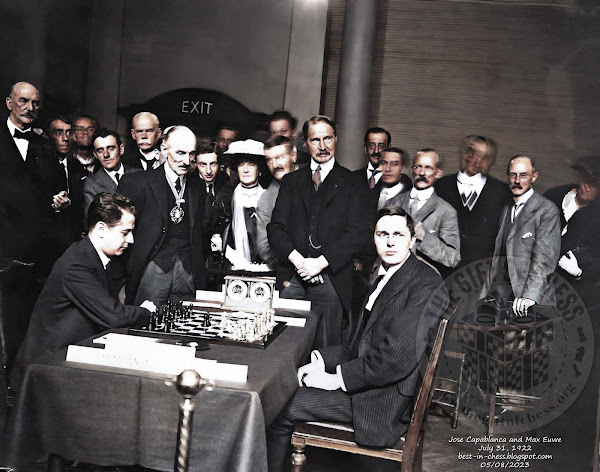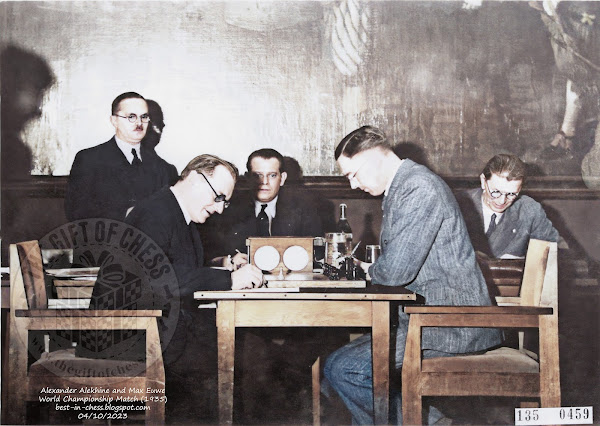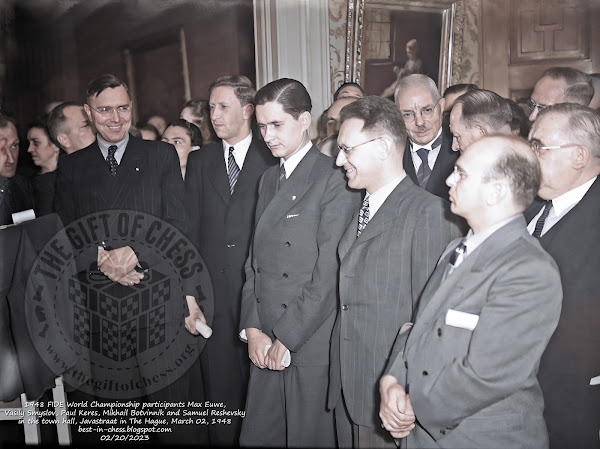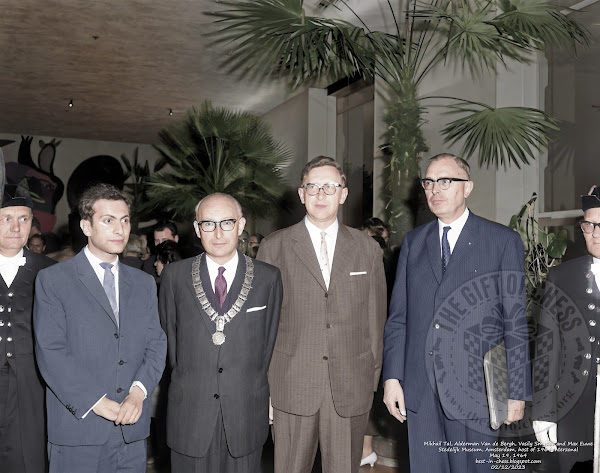July 31 1922

Notice to commercial publishers seeking use of images from this collection of chess-related archive blogs. For use of the many large color restorations, two conditions must be met: 1) It is YOUR responsibility to obtain written permissions for use from the current holders of rights over the original b/w photo. Then, 2) make a tax-deductible donation to The Gift of Chess in honor of Robert J. Fischer-Newspaper Archives. A donation in the amount of $250 USD or greater is requested for images above 2000 pixels and other special request items. For small images, such as for fair use on personal blogs, all credits must remain intact and a donation is still requested but negotiable. Please direct any photographs for restoration and special request (for best results, scanned and submitted at their highest possible resolution), including any additional questions to S. Mooney, at bobbynewspaperblogs•gmail. As highlighted in the ABC News feature, chess has numerous benefits for individuals, including enhancing critical thinking and problem-solving skills, improving concentration and memory, and promoting social interaction and community building. Initiatives like The Gift of Chess have the potential to bring these benefits to a wider audience, particularly in areas where access to educational and recreational resources is limited.
| Best of Chess |
Fischer Newspaper Archives
• Robert J. Fischer, 1955 ➦
• Robert J. Fischer, 1956 ➦ • Robert J. Fischer, 1957 ➦ • Robert J. Fischer, 1958 ➦ • Robert J. Fischer, 1959 ➦ • Robert J. Fischer, 1960 ➦ • Robert J. Fischer, 1961 ➦ • Robert J. Fischer, 1962 ➦ • Robert J. Fischer, 1963 ➦ • Robert J. Fischer, 1964 ➦ • Robert J. Fischer, 1965 ➦ • Robert J. Fischer, 1966 ➦ • Robert J. Fischer, 1967 ➦ • Robert J. Fischer, 1968 ➦ • Robert J. Fischer, 1969 ➦ • Robert J. Fischer, 1970 ➦ • Robert J. Fischer, 1971 ➦ • Robert J. Fischer, 1972 ➦ • Robert J. Fischer, 1973 ➦ • Robert J. Fischer, 1974 ➦ • Robert J. Fischer, 1975 ➦ • Robert J. Fischer, 1976 ➦ • Robert J. Fischer, 1977 ➦ • Robert J. Fischer, 1978 ➦ • Robert J. Fischer, 1979 ➦ • Robert J. Fischer, 1980 ➦ • Robert J. Fischer, 1981 ➦ • Robert J. Fischer, 1982 ➦ • Robert J. Fischer, 1983 ➦ • Robert J. Fischer, 1984 ➦ • Robert J. Fischer, 1985 ➦ • Robert J. Fischer, 1986 ➦ • Robert J. Fischer, 1987 ➦ • Robert J. Fischer, 1988 ➦ • Robert J. Fischer, 1989 ➦ • Robert J. Fischer, 1990 ➦ • Robert J. Fischer, 1991 ➦ • Robert J. Fischer, 1992 ➦ • Robert J. Fischer, 1993 ➦ • Robert J. Fischer, 1994 ➦ • Robert J. Fischer, 1995 ➦ • Robert J. Fischer, 1996 ➦ • Robert J. Fischer, 1997 ➦ • Robert J. Fischer, 1998 ➦ • Robert J. Fischer, 1999 ➦ • Robert J. Fischer, 2000 ➦ • Robert J. Fischer, 2001 ➦ • Robert J. Fischer, 2002 ➦ • Robert J. Fischer, 2003 ➦ • Robert J. Fischer, 2004 ➦ • Robert J. Fischer, 2005 ➦ • Robert J. Fischer, 2006 ➦ • Robert J. Fischer, 2007 ➦ • Robert J. Fischer, 2008 ➦ |
Chess Columns |
David Bentz, 1947
October 27 1947
The Baltimore Sun, Baltimore, Maryland, Monday, October 27, 1947
Just-Analyzed Opening
It happens maybe once in a lifetime that someone will play an opening you have just analyzed, especially when you have the black, Stone explained.
Bentz—David Bentz, 46, who won the Maryland State chess championship several months ago—did not participate in the exhibition because he “just didn't feel like it.”
However, the occasion was a happy one for Bentz, a disabled war veteran who works in the Post Office. He taught Kashdan to play chess when they were both students at Peter Stuyvesant High School in New York city.
“Now Pupil Can Beat Teacher”
“Kashdan didn't know a move when he joined the club,” said Bentz, who then was president of the Stuyvesant Chess Club and captain of its chess team. “Now the pupil can beat the teacher.”
Bentz brought his chessboard and pieces, a large tournament-size set of the Staunton pattern the biggest one used in the exhibition—and lent it to Graydon L. Schreiber, 16, of 4001 Round Top road, of the Polytechnic chess team. It almost brought him luck.
“I made one mistake,” said Schreiber. “Mr. Kashdan even said I played a fine game. Up until that error, I had a draw. I might have even won.”
Virgil Miles Kimm, 1952
February 24 1952
El Paso Times, El Paso, Texas, Sunday, February 24, 1952
Chess players on both sides of the Rio Grande are practicing for the first international Global Chess tournament opening Wednesday in Juarez. Grouped around the four-handed board, in a recent practice session held at Texas Western College, are: (seated, left to right) Col. V. M. Kimm, former West Point champion; Leon Apteckar, inventor of the game; Alfred Coles, an outstanding national chess tournament player, and Dr. E. T. Ruff of TWC. Standing, J. G. Diaz, Jack Galicia and Antonio Ruiz Ruida.
Global Chess Tournament To Be Conducted In Juarez
The first International Global Chess tournament using the four-man game invented by Leon Apteckar of El Paso, will open Wednesday in the Club de Ajedrez in Juarez.
Outstanding players from both sides of the border have signed up for the tournament, including Antonio Ruiz Rueda, a top-ranking Mexican chess player, and Col. Virgil M. Kimm, former chess champion of West Point and later, of Hawaii.
Others taking part in the tournament will be El Paso's Alfred Coles, one of the nation's top chess players; Jose G. Diaz, Jack Galicia, Genaro Saldivar and Sosthenes Pacheco.
On both sides of the river, players have been practicing for the competition.
CHALLENGE MATCHES
Players on both sides of the river have been practicing for the tournament, with challenge matches being held as preliminaries.
Global Chess, Apteckar hopes, is the answer to the objection that ordinary chess is a two-man game that bars sociable foursomes. The inventor, who worked out the details of the game while recovering from a near-fatal accident, fondly hopes that some day his Global Chess will shoulder its way into the parlor as a competitor against bridge or canasta.
Colonel Kimm is one of the strongest backers of the game.
WOMEN CAN JOIN
“Chess has always been a man's game and it generally was unfair to pit man against woman,” the colonel said. “The four-handed game changes this situation. Women now can share in a game that has made chess a parlor game to be played by couples. The four-handed game also is a great leveler of skills. Under the rules, partners cannot confer, so it would, be futile for a brilliant player to plan a complicated game unless experienced partners can figure out what he is trying to do. The game opens a greater field for enjoyment of the game on equal levels of skill. At least, chess has become a game that husband and wife can enjoy together on equal terms.”
The game has gained wide publicity below the border, where it has spread more rapidly than in the U.S.
Apteckar has found, from recent matches, that his chess game has another advantage over the conventional form.
“I thought the game would eliminate the kibitzers,” he said, “but it's really an improvement for the kibitzer. He can sit between players and kibitz either two hands at a time—or all four.”
Apteckar is a statistician for El Paso Natural Gas Co.
Virgil Miles Kimm, 1927
1927
Virgil Miles Kimm, 1927 Graduate of West Point Military Academy.
June 14 1927
The Gazette, Cedar Rapids, Iowa, Tuesday, June 14, 1927
FORMER BLAIRSTOWN YOUTH GRADUATED FROM WEST POINT
—True Art cut.
VIRGIL M. KIMM.
CADET Virgil M. Kimm, United States Military academy, West Point, who formerly attended Blairstown high school, Blairstown, Iowa, and Drake university, Des Moines, passed one great milestone of his life today when he was graduated from the military academy and commissioned a second lieutenant in the United States Army. He was appointed to the academy by Harry E. Hull. The graduation exercises, marking the end of West Points brilliant June week, were held in the presence of Dwight F. Davis, secretary of war, who delivered the address of the day and presented the diplomas. Kimm qualified as rifle marksman and was appointed a cadet corporal in 1925; he was a member of the class ring and seal committee in 1925-26 and the West Point chess club, of which he was secretary in 1924 and 1925,and president in 1926 and 1927; and he was a participant in the H. Y. P. W. (Harvard, Yale, Princeton, and West Point) chess tournaments of 1925 and 1926.
Virgil Miles Kimm, 1987
Virgil Miles Kimm, unknown date.
August 09 1987
The Tampa Tribune, Tampa, Florida, Sunday, August 09, 1987
VIRGIL KIMM, 86, of Tampa, died Friday. A native of Watkins, Iowa, he had been a resident of the Tampa Bay area for seven years, moving from Johnston, R.I. He was a retired U.S. Army lieutenant colonel, a 1927 graduate of West Point Military Academy, founder of West Point Chess Club, founder of International Courier Chess Club, a U.S. Army veteran of World War II, a recipient of the Bronze Star, and a member of Church of Incarnation.
He is survived by his wife, Margaret; one son, Richard of Orlando; one daughter, Barbara Cambia of Norwalk, Conn.; four brothers, Weston, Merrill, Raymond and Arnold, all of Iowa; two sisters, Evelyn Fessler of Iowa and Millie Carter of Winter Haven; and five grandchildren.
A.P. Boza Funeral Home, Town 'N Country Chapel.
Jose Capablanca, 1906
December 29 1906
El Paso Herald, El Paso, Texas, Saturday, December 29, 1906
Scene In Intercollegiate Chess Tournament In New York
In the intercollegiate chess tournament between Columbia, Harvard, Yale and Princeton Jose R. Capablanca, the young Cuban chess prodigy, headed Columbia's team. He is conceded to be the best chess player of the 16 who entered the arena.
El Paso Herald, El Paso, Texas, Saturday, December 29, 1906
Best Chess Player At Columbia College
New York, Dec. 27.—In the intercollegiate chess tournament between Columbia, Harvard, Yale and Princeton, Jose R. Capablanca, the young Cuban chess prodigy, headed Columbia's team. He is conceded to be the best chess player of the 16 who entered the arena.
'til the world understands why Robert J. Fischer criticised the U.S./British and Russian military industry imperial alliance and their own Israeli Apartheid. Sarah Wilkinson explains: Tweets by swilkinsonbc |
 “What a sad story Fischer was,” typed a racist, pro-imperialist colonial troll who supports mega-corporation entities over human rights, police state policies & white supremacy. |
To which I replied: “Really? I think he [Bob Fischer] stood up to the broken system of corruption and raised awareness! Whether on the Palestinian/Israel-British-U.S. Imperial Apartheid scam, the Bush wars of ‘7 countries in 5 years,’ illegally, unconstitutionally which constituted mass xenocide or his run in with police brutality in Pasadena, California-- right here in the U.S., police run rampant over the Constitution of the U.S., on oath they swore to uphold, but when Americans don't know the law, and the cops either don't know or worse, “don't care” -- then I think that's pretty darn “sad”. I think Mr. Fischer held out and fought the good fight, steadfast til the day he died, and may he Rest In Peace. Educate yourself about U.S./State Laws -- https://www.youtube.com/@AuditTheAudit/videos After which the troll posted a string of profanities, confirming there was never any genuine sentiment of “compassion” for Mr. Fischer, rather an intent to inflict further defamatory remarks. |
This ongoing work is a tribute to the life and accomplishments of Robert “Bobby” Fischer who passionately loved and studied chess history. May his life continue to inspire many other future generations of chess enthusiasts and kibitzers, alike.
The photograph of Bobby Fischer (above) from the March 02, 1956 The Tampa Times was discovered by Sharon Mooney (Bobby Fischer Newspaper Archive editor) on February 01, 2018 while gathering research materials for this ongoing newspaper archive project. Along with lost games now being translated into Algebraic notation and extractions from over two centuries of newspapers, it is but one of the many lost treasures to be found in the pages of old newspapers since our social media presence was first established November 11, 2017.






































